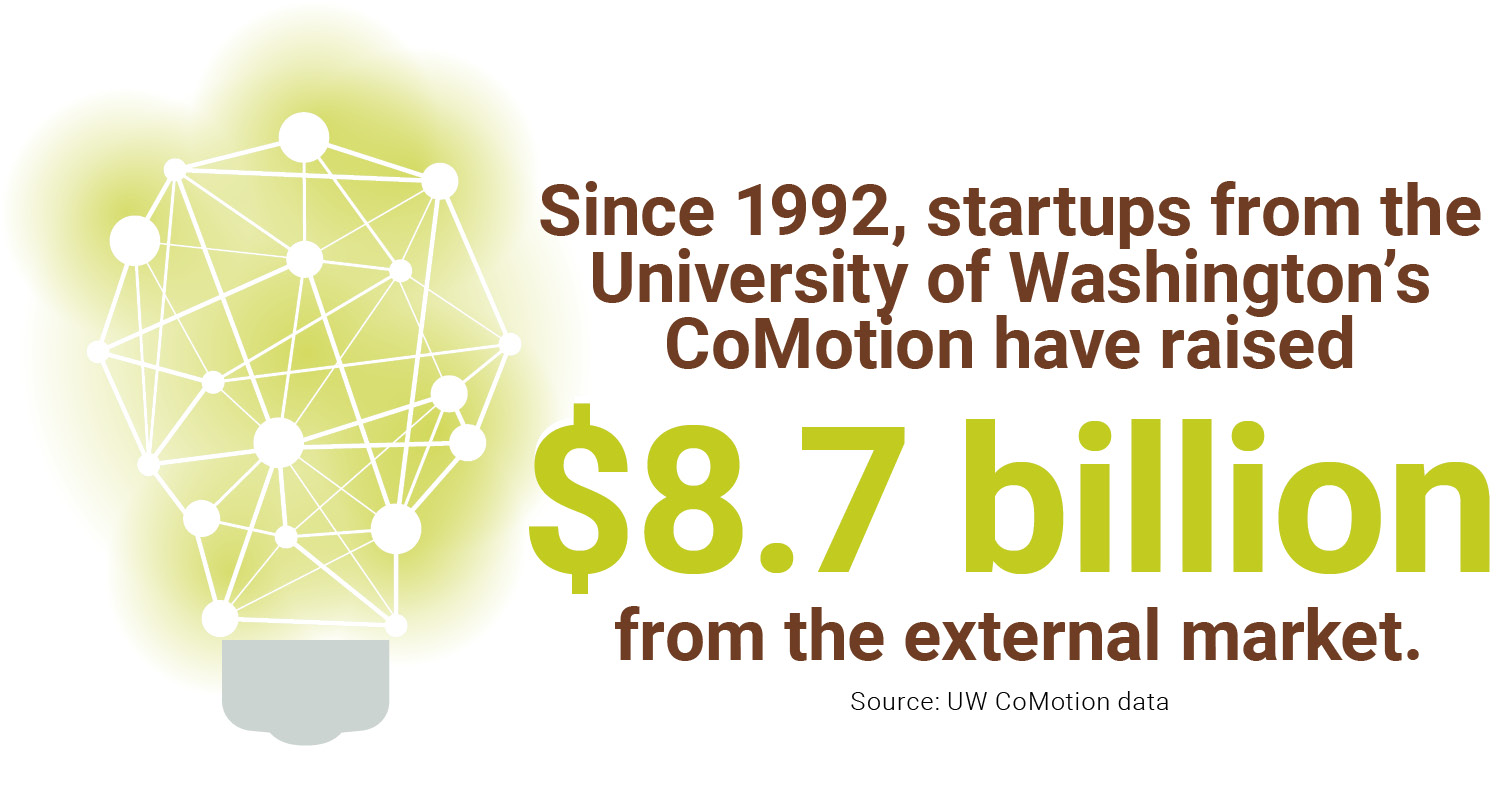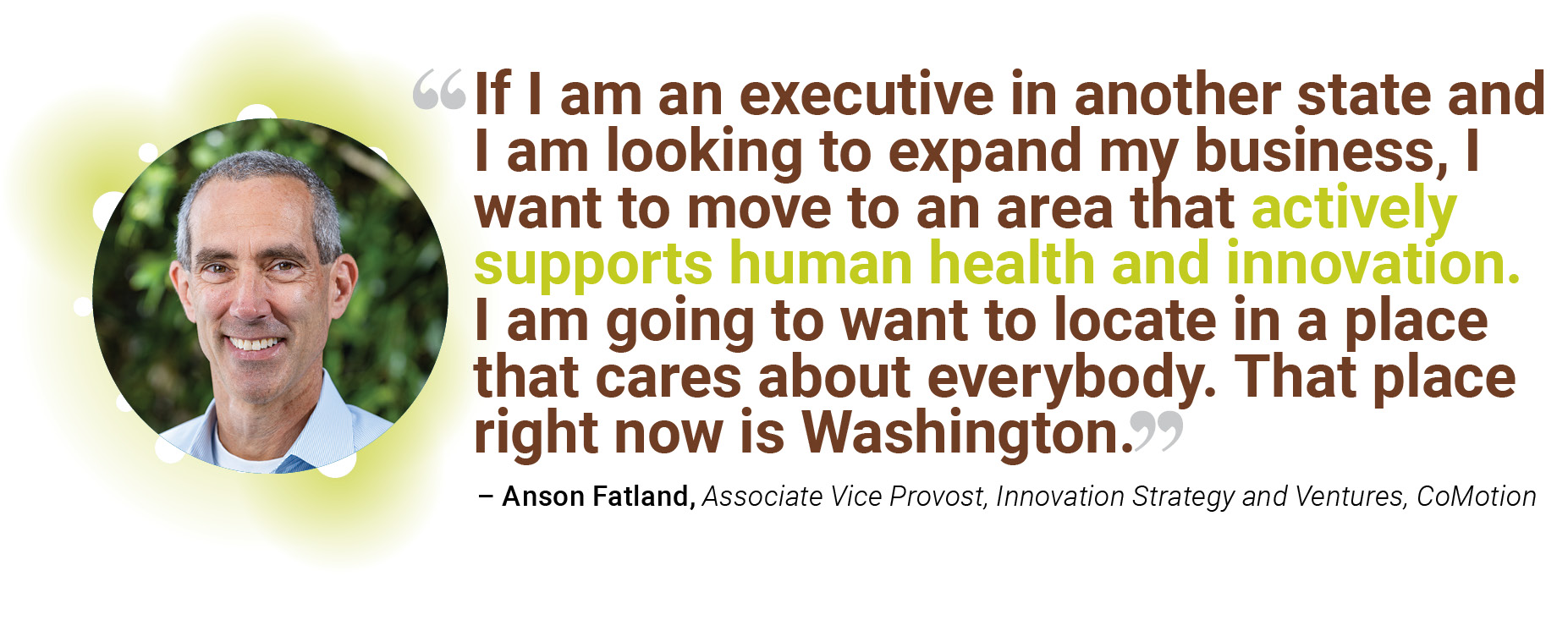CoMotion is much more than the University of Washington’s business incubator. By showing innovators how to become entrepreneurs and build successful companies, CoMotion serves as the university’s vital link between education, research and economic development.
Anson Fatland, associate vice provost for innovation strategy and ventures at CoMotion in Seattle, says that while CoMotion serves as the technology transfer office of UW, “we do so much more than that. We are a service provider to all departments across our campuses. The bottom line is that we train people how to think like an entrepreneur.”
This training includes showing people how to protect their ideas and connect to capital. “We develop funding programs to help late-stage research projects get turned into viable commercial ventures,” he says. “We provide incubator space where innovators can grow their venture at a site in proximity to their lab; and we provide mentors in all kinds of fields.”
This collaboration produces many success stories. Since 1992, startups from UW have raised $8.7 billion from the external market. As of July 2023, there are 110 spinoffs from CoMotion employing over 1,000 people. And the growth is multiplying.

Over the last five years, users of CoMotion services have filed 785 patents, of which 384 have been granted. During that same period, 2,160 licenses were granted, according to data from the University of Washington.
Better Health Starts Here
Success is found not just in numbers, says Fatland. More important, he notes, it’s found in lives saved and improved. “PVP Biologics was developed by a researcher here,” he says. “She developed a protein for treating celiac disease. It was later sold for $300 million.”
Altpep grew out of another research discovery at UW. The company developed a test and therapeutics to treat dementia. Zap Energy is a nuclear fusion startup working to develop small modular power plants. It has raised $200 million.
All Patients Safe is a training program designed to help people identify the early warning signs of suicide. Jennifer Stuber developed the program at UW’s CoMotion after losing her husband Matt Adler to suicide.
Fatland says CoMotion focuses on three main goals: promoting diversity and equity among the UW cohort of entrepreneurs; contributing to population health in the surrounding region and beyond; and fostering and supporting innovation in the UW community.
“If I am an executive in another state and I am looking to expand my business, I want to move to an area that actively supports human health and innovation,” says Fatland. “I am going to want to locate in a place that cares about everybody. That place right now is Washington.”
Beyond CoMotion, there is an abundance of UW resources devoted to making the world a better place for everyone.
Three innovative programs at UW illustrate this perfectly. On July 19, U.S. Sen. Patty Murray, D-Wash., announced a $10 million grant for UW semiconductor research and workforce development. The money will go to the U.S.-Japan University Partnership for Workforce Advancement and Research & Development in Semiconductors (UPWARDS) for the Future project, a partnership between UW and five Japanese universities. The National Science Foundation allocates the grant, which is funded by the federal CHIPS and Science Act.

“This funding is a big deal for the University of Washington and will help our state remain a leader in semiconductor manufacturing and building a skilled semiconductor workforce,” Sen. Murray said in announcing the grant. “The UPWARDS for the Future project is going to give students in Washington state unique opportunities to collaborate with their peers and become part of tomorrow’s STEM workforce. It is great to see the CHIPS and Science Act at work.”
Healing Earth with Science
Tackling climate change is another field of research at UW. Earlier this year, the Environmental Protection Agency announced a $1.27 million grant to UW for a community-based project aimed at water and soil preservation along the Duwamish River. Melanie Malone, principal investigator of the pollution that has historically taken place there, said in announcing the grant that “as the impacts of climate change become more frequent and severe, it is important to center community voice. … We look forward to co-creating inclusive and equitable solutions with our community partners about environmental justice concerns that most impact them.”
In other climate-related activity, the UW Department of Environmental & Occupational Health Sciences (DEOHS) received about $300,000 in grants from the UW Population Health Initiative to study the effects of extreme heat and wildfire smoke on human health. “The projects we funded collectively touch all three pillars of population health — human health, environmental resilience, and social and economic equity — and have the potential to develop findings that will improve health and well-being both locally and globally,” said Ali H. Mokdad, UW’s chief strategy officer for population health and UW professor of health metrics sciences.
As climate change worsens, cases of extreme heat and uncontrolled wildfires increasingly threaten human and wildlife populations in Washington and the Pacific Northwest. The grants will enable researchers at UW to study the long-term effects of these disasters and figure out ways to lessen the adverse impacts on people and animals. In Washington, Indigenous peoples and tribal communities are especially at risk to these dangers.

